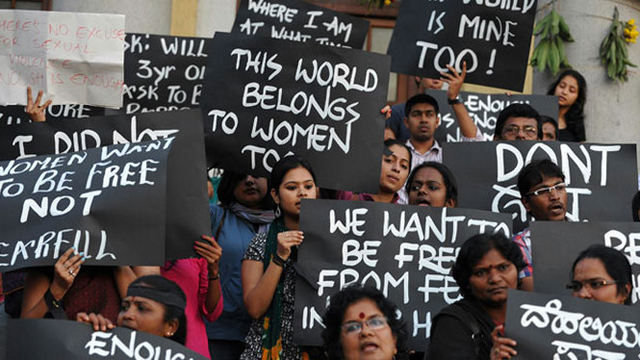
Source: Citizenfresh
The kind of reactions I get when I tell someone I am a feminist vary from an awkward interaction directly after the word flows from my mouth to a feeling of unity and pride from the other party in the conversation. At risk of this sounding like an “open letter” odyssey online blog, I’ll go on to say that this is not me trying to convince anyone to be a feminist or change their mind to define themselves as that term, though as a disclaimer I proudly call myself one. This is to explain why the subjugation of women affects all of you directly. When I say you I mean it affects every single American man, woman or child and their way of life when even women across the world face oppression[1].
Most often times people do not feel the need to take action against a problem unless it begins to negatively affect them. However, unbeknownst to the average American, the oppression of all women directly affects every citizen. It definitely has not been working to chastise anyone for not being a feminist. That form of communication between the left and the right has gotten nowhere but deepening an already existing division in the American population. It has become the left versus right, blue versus red and everything else is completely overshadowed, leaving the true issues that need to be resolved relatively untouched by policy makers. Statistics and facts do not always work because the real goal that is often overlooked is that one has to make another human being feel empathy if they do not already feel it. However, besides empathy, there are ways to show how the oppression of women can affect us across the world regarding violence and economic inequality.
In the West in the year 2017, we have now put into practice an idea that would’ve been revolutionary in the 50s. Women work outside the home. Though in America we see it becoming more of a cultural norm, around the world and even still in the U.S., that value is not exactly equal from an economic standpoint. Women’s work taking care of the household is often unseen and invisible around the world since it is considered economically inactive and therefore of no value. Several sources of the United Nations library state that the work of non-primary producers, also known as housewives, in an unpaid capacity is of little or no importance. Their labor in the household is not included in the UN system of national accounts used by all countries The global economic system recognizes no value other than money. Because of this, there is a continuation of putting no value to peace, preservation of natural resources for the future, or their free labor in the domestic sphere[2].

Source: Citizenfresh
Women being undervalued in the economy results in an unequal distribution of goods by the structures running their government. This is not just a problem for the women of third world countries or around the globe but for the women of western culture as well. When women are confined to private sphere duties they are overlooked as contributing members to society, preventing a thriving economy. Stimulus packages for the U.S., for example, overlook growth for “feminine” jobs in healthcare and education negatively affecting economic wellness[3]. The idea that women’s jobs remain in the household or in certain sectors of the workforce create the idea that they are less valuable. Therefore, policy makers confine to societal views and create an imbalance in their actions to help women as earners and contributors, hurting growth and production for all.
Finally, continuing with the idea that our societal culture and values affect daily living, violence against women around the world affects our own national security. The socially constructed idea of masculinity attributes warfare to male-aggression. Because of this, women are very little involved with security issues where it is the belief they have zero knowledge. When it comes to national security and issues concerning warfare, there is a problem with incorporating feminism. Military officials believe there is no room for it since social norms make men seem as if their job is to protect their women. Men are doing the attacking in the first place and women have no say in their own protection, creating a more militarized society. International relations has come to recognize with empirical data that women have positive economic outcome, meaning they are able to contribute and people are living healthier longer, more productive lives. The predictor of peacefulness in a state depended on its level of violence against women[4]. Peacefulness in one country can have a direct affect on American national security for those countries who interact with us as allies and so on.
I can get to the nitty gritty of why someone should care about these things with more theories from feminist authors stating statistics and more empirical data. There are tons of literature explaining connections and scholarly conclusions such as these. Unfortunately, in a lot of cases it takes more for empathy to be created, it takes the fact that it affects them directly as well. I just discussed on how violence and economic inequality creates a domino effect for all members of a nation including the U.S. However, it is safe to say that not everyone is going to take time to read or care. What is important is knowledge on these issues and spreading that knowledge through all channels of communication including word of mouth. If one believes that these oppressive instances against women affect all women, the platform for the feminist goals become united not just with “feminists” but the universal idea that this is an issue for every man, woman and child. I strongly believe that with more unity, there will be more action to achieve the goals needed to empower unheard women around the world.
References:
[1] HUDSON, V. M. (2017). HILLARY DOCTRINE. S.l.: COLUMBIA UNIV PRESS.
[2] Nash, T. (Director). (1995). Who’s Counting? Marilyn Waring on Sex, Lies and Global Economics [Video file]. New Zealand: National Film Board of Canada . Retrieved June 20, 2017, from https://www.nfb.ca/film/whos_counting/
[3] Tickner, J. A. (2014). A feminist voyage through international relations. Oxford: Oxford University Press.
[4] Tickner, J. A. (2014). A feminist voyage through international relations. Oxford: Oxford University Press.

Leave a Reply
You must be logged in to post a comment.